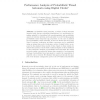Free Online Productivity Tools
i2Speak
i2Symbol
i2OCR
iTex2Img
iWeb2Print
iWeb2Shot
i2Type
iPdf2Split
iPdf2Merge
i2Bopomofo
i2Arabic
i2Style
i2Image
i2PDF
iLatex2Rtf
Sci2ools
138
Voted
FORMATS
2003
Springer
2003
Springer
Performance Analysis of Probabilistic Timed Automata Using Digital Clocks
Probabilistic timed automata, a variant of timed automata extended with discrete probability distributions, is a specification formalism suitable for describing both nondeterministic and probabilistic aspects of real-time systems, and is amenable to model checking against probabilistic timed temporal logic properties. In the case of classical (non-probabilistic) timed automata, it has been shown that for a large class of real-time verification problems correctness can be established using an integer-time model, inducing a notion of digital clocks, as opposed to the standard dense model of time. Based on these results, we address the question of under what conditions digital clocks are sufficient for the performance analysis of probabilistic timed automata. We extend previous results concerning the integer-time semantics of an important subclass of probabilistic timed automata to consider the computation of expected costs or rewards. We illustrate this approach through the analysis of...
Related Content
| Added | 06 Jul 2010 |
| Updated | 06 Jul 2010 |
| Type | Conference |
| Year | 2003 |
| Where | FORMATS |
| Authors | Marta Z. Kwiatkowska, Gethin Norman, David Parker, Jeremy Sproston |
Comments (0)

